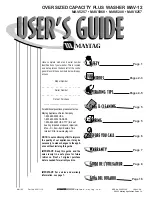
15
If the machine does not work
If the machine does not work, check to see whether there is some simple fault that you can rectify your-
self. Follow the instructions below. Aslo check page 11, Fault-tracing programme.
Problem
Response
1. You have forgotten to press the main switch.
2. The door is not properly closed.
3. A fuse has blown.
4. The power supply plug is not inserted in its socket.
The machine will not start
Water remains in the machine
If the machine should overfill
with water, the outlet pump
will start automatically. If,
however, the water does not
pump out, the fault may be
due to one of these reasons:
1. Outlet hose kinked Check that the hose is not kinked or sharply bent.
2. The strainers are blocked. Clean the coarse and fine strainer and the filter.
3.Outlet hose blocked. Check that nothing has blocked the hole where the outlet hose is
connected to the sink drain trap. Particles of food can collect as shown in the drawing.
Check, too, that the conical connecting pipe is cut so that the internal diameter is as
large as possible, but at least 18 mm.
Poor dishwashing
performance
Check the following points:
1.That the spray arms are not being prevented from turning by items sticking
down from the upper basket and that the holes in the spray arms are not
blocket by dirt.
2.That the spray arms can rotate freely, and are not being slowed by grit in the
bearings. Spin the arms by hand: if they do not spin freely, lift them off and
clean the bearings and mounts.
3.That the machine is admitting sufficient water. Check the inlet hose for kinks
or sharp bends. Check that the water pressure is sufficient: 0.03–1 MPa (4–
145 PSI).
4.That the correct quantity of detergent has been used: see page 5. Do not use
old or caked detergent. Keep the detergent dry and cool in a closed pack.
Remember that it should be bought and used fresh.
5.That the strainer is properly positioned and is clean (see page 10).
6. That you have chosen a enough strong programme.
Grey film on washed items
A tendency for a grey film to develop on washed items may be due to lime from hard
water. The problem can often be alleviated by using an acidic rinse aid, i.e. one
containing citric acid (low pH value, as shown on the rinse aid label). If the dishwasher
incorporates a water softener, the grey film may indicate that there is no salt left in the
softener. Refill it with salt.



































